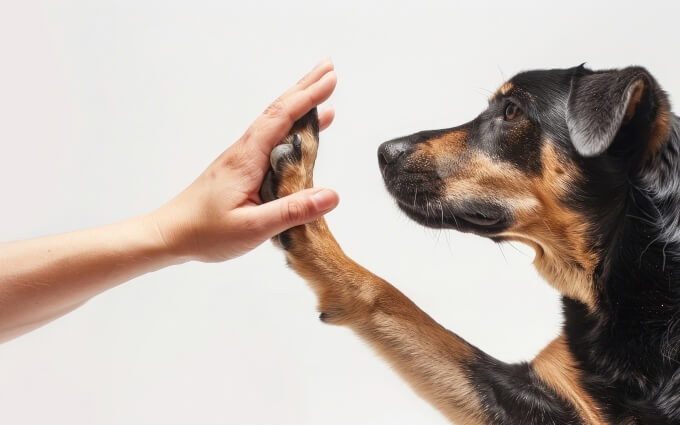- Home
- Dog Behavior
- How to get your dog to stop barking
How to get your dog to stop barking
Barking can be a challenge, but with the right techniques you can solve the problem. Understand the causes and apply effective training methods when you experience excessive barking in your dog.

- 25

Understand why your dog barks
The first step to getting your dog to stop barking is to understand why they bark in the first place. Dog breed, age and individual personality traits all play a role in how much and why a dog barks. Some common causes of barking include:
- Protecting territory
- Boredom or lack of exercise
- Anxiety or fear
- Social interaction
By identifying the cause of barking, you can better adapt your training method to tackle the problem.
Use positive reinforcement
Positive reinforcement is one of the most effective training methods. It involves rewarding your dog when it exhibits the behavior you want. For example, when your dog stops barking on command, you can give them a treat or praise. Over time, your dog will associate being quiet with something positive.
Steps for using positive reinforcement
- Choose a specific command like "quiet" or "calm"
- Reward your dog immediately when they stop barking
- Repeat the exercise consistently
Remember that patience and consistency are key to success with positive reinforcement.
Avoid unintentional reinforcement
Sometimes we can inadvertently encourage our dog to bark without realizing it. For example, if your dog is barking for attention and you respond by yelling at them or giving them attention, even negative attention, this can reinforce the barking. Here are some tips to avoid unintentional reinforcement:
- Ignore your dog when they bark for attention
- Only give attention when they are quiet
- Be consistent in your response
By avoiding unintentional reinforcement, you can help your dog learn that barking does not lead to the desired response.
Create a calm and stimulating environment
One of the best ways to reduce barking is to ensure your dog has a stimulating and calm environment. This can include regular exercise, mental stimulation and a safe environment. Consider the following to improve your dog's daily life:
- Daily walks and play sessions
- Interactive toys and games
- Training exercises and challenges
A well-stimulated and tired dog is less likely to bark for no reason. Make sure your dog gets the necessary exercise and mental stimulation every day.
Enlist professional help if needed
Sometimes it may be necessary to seek professional help to manage your dog's barking. A professional dog trainer or behaviorist can offer tailored solutions and help identify deeper causes of barking. If you've tried different methods without success, a professional can provide new perspectives and techniques.
Benefits of professional help
- Expert assessment of your dog's behavior
- Personalized training plans
- Long-term solutions
Involving a professional can be a good investment in both your dog's and your own quality of life.
Train calm and relaxation
An important part of getting your dog to stop barking is training them to be calm and relaxed. This can be achieved through various relaxation techniques and training exercises. Try the following to promote calm and relaxation:
- Massage your dog to relieve tension
- Use calming commands like "calm" or "relax"
- Create a calm atmosphere with soft music or dim lighting
Training calm and relaxation can make a big difference in your dog's behavior and reduce barking tendencies.
Remember patience and consistency
Training your dog to stop barking is a process that requires patience and consistency. No solution works overnight and it's important to stay committed to the training. Make sure to follow up on the training exercises daily and be consistent in your responses to barking. With time and persistence, you will see improvements in your dog's behavior.
Tips for patience
- Focus on small progress
- Be positive and encouraging
- Take breaks if you feel frustrated
Remember that patience is a virtue and consistent training will pay off in the long run.
Frequently Asked Questions about stopping dogs from barking
How do I train my dog to stop barking?
Use positive reinforcement by rewarding quiet behavior and teaching commands like “quiet” consistently.
Why does my dog bark so much?
Dogs bark to communicate, express excitement, warn of danger, or because they are bored or anxious.
Is it okay to ignore my dog's barking?
Ignoring can work for attention-seeking barking, but underlying causes like fear or boredom should be addressed.
Do anti-barking devices really work?
Some devices may reduce barking, but training and addressing the root cause are more effective long-term solutions.
Can older dogs learn to stop barking excessively?
Yes, dogs of any age can learn with patience, consistent training, and proper guidance.
- 25
 Marcin Solgaard
Marcin Solgaard
Marcin is a true dog enthusiast! He is always seen with his 9-year-old boxer by his side. Marcin believes that dogs thrive on love, fun and positive experiences. On their daily adventures, people often stop Marcin to ask how his boxer is so happy and well-behaved. He happily shares tips on dog behavior and fun activities to create a happy and harmonious life with your dog.
-
Food & Nutrition
 The Best Foods to Boost Your Dog's Immune System
The Best Foods to Boost Your Dog's Immune SystemTo keep your dog healthy and resilient, fueling their immune system with the right foods is key. In this post, we'll cover the top nutrient-packed foods that can give your dog's immune system the support it needs, helping them fend off illness and stay energetic.
 Marcin SolgaardOct 04, 20249
Marcin SolgaardOct 04, 20249 -
Dog Behavior
 Does My Dog Know I Care About It?
Does My Dog Know I Care About It?Discover the ways your dog shows it knows you care and how you can reinforce that loving bond through simple actions and daily interactions.
 Cassandra DalgaardAug 05, 202444
Cassandra DalgaardAug 05, 202444 -
Dog health
 Which Emotions Do Dogs Actually Experience? Understanding Your Dog's Emotions
Which Emotions Do Dogs Actually Experience? Understanding Your Dog's EmotionsDogs experience a variety of basic emotions similar to those of a young child. Learn about the emotions your dog truly feels, how they express them, and what it means for your relationship.
 Cassandra DalgaardJul 30, 202478
Cassandra DalgaardJul 30, 202478 -
Tips & Tricks
 How to Train Your Dog to Walk Off-Leash
How to Train Your Dog to Walk Off-LeashThis guide will walk you through everything you need to know, from essential commands to mastering off-leash walks even in distracting environments
 Marcin SolgaardJul 02, 202451
Marcin SolgaardJul 02, 202451 -
Tips & Tricks
 How to Train Your Dog to Give Paw
How to Train Your Dog to Give PawTeaching your dog to give paw is a fun and rewarding experience that strengthens your bond. This guide walks you through the process with tips, tricks, and plenty of paw-sitive reinforcement.
 Marcin SolgaardApr 11, 202441
Marcin SolgaardApr 11, 202441 -
Food & Nutrition
 How to Choose the Right Diet for Your Allergic Dog
How to Choose the Right Diet for Your Allergic DogFind out how to select the perfect diet for your dog with allergies. Learn about elimination diets, hypoallergenic foods, and the best ingredients to keep your furry friend healthy and happy.
 Marcin SolgaardJun 09, 202427
Marcin SolgaardJun 09, 202427 -
Dog health
 Essential Tips for Caring for Your Dog's Teeth and Gums
Essential Tips for Caring for Your Dog's Teeth and GumsMaintaining your dog's dental health is crucial for their overall well-being. This guide covers various methods to care for your dog's teeth and gums, ensuring they stay healthy and happy.
 Cassandra DalgaardAug 19, 202436
Cassandra DalgaardAug 19, 202436 -
Tips & Tricks
 How to Keep Your Dog Off the Furniture
How to Keep Your Dog Off the FurnitureEnsuring your dog stays off the furniture can be a challenge, but with the right techniques and consistency, you can create a pet-friendly environment that respects your space.
 Marcin SolgaardJun 24, 202439
Marcin SolgaardJun 24, 202439 -
Tips & Tricks
 How to Teach Your Dog to Come When Called
How to Teach Your Dog to Come When CalledThis guide walks you through the process, from selecting the right command to dealing with distractions, ensuring a strong recall every time.
 Marcin SolgaardJul 10, 202448
Marcin SolgaardJul 10, 202448 -
Dog Behavior
 Why Your Dog Ignores You and How to Change It
Why Your Dog Ignores You and How to Change ItIs your dog ignoring you? Explore the reasons behind this behavior and actionable steps to bring back the focus, from training techniques to environmental adjustments.
 Marcin SolgaardJul 16, 202439
Marcin SolgaardJul 16, 202439










